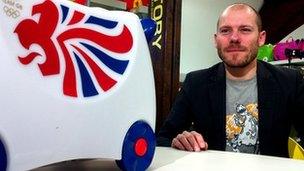Bristol children's suitcase design firm expands production from China to UK
- Published

Rob Law wants more support for UK manufacturing
"Having heard the government preaching about UK production, I was flabbergasted to find there was no support, no grants, nothing".
Rob Law is a Bristol designer - the man who gave the world Trunki, a "ride-on" childrens' suitcase.
The cases are currently made in China but Mr Law has decided to open an extra production line in the UK - in Devon.
But despite ministers' enthusiasm for UK manufacturing, the entrepreneur claims the government is no help.
Rob Law is used to knock backs. Six years ago he pitched his innovative suitcases for children on TVs Dragons' Den. Multimillionaire investor Theo Paphitis broke the strap, and the Dragons rejected his idea out-of-hand.
Undeterred, Mr Law improved the design and six years on, Trunki is a global success.
"Last year we had a turnover of £6m, and cleared a profit of £1m," he said. Trunki is now exported to 62 countries.
Made in Britain
These are big numbers. But the firm only employs 23 people at its Bristol HQ. This is typical of modern design firms. A few highly skilled designers, marketing experts and finance brains create a new product, almost entirely on a computer. Then they get it made in China.

Making the suitcases at this Devon factory will create 20 new jobs
The patents are all owned here, the money stays in the UK. But few jobs are created.
Making Trunki in Devon will double the number of British jobs at the firm. To handle the work, Mr Law's contractor, Injection Plastics, is moving to larger premises. The huge moulds and tools needed are also being bought from UK companies.
Over the past year, British ministers have been banging the drum for UK manufacturing. In February, Nick Clegg and Vince Cable came to Bristol for a Manufacturing Summit. Both declared it was time to celebrate everything "Made in Britain".
At the summit, Deputy Prime Minister Nick Clegg said: "I want to see more businesses that are confident they can create jobs and get Britain building and making things again."
Fancy business
In the jargon, economists call this "rebalancing". Britain, they say, needs to make more and buy less. The economy needs more investment in factories and export businesses - less reliance on banking, less consumer debt, and less retailing.
So when a small but high-profile company decided to bring manufacturing back home, they expected some help. Mr Law said he looked around for grants, tax breaks, assistance - and found nothing.
Equipping the factory in Devon cost about half a million pounds. Modern plastic manufacturing is a fancy business, involving hi-tech robots and expensive moulding machines.
Until 2007, 40% of this could be written off against tax. Now that figure has dropped to 20%, and from 1 April it will fall further, to 18%.
On an outlay of £500,000, the old rate would have cut the company's tax bill by around £42,000. Under the new regime the saving will be £18,000.
Richard Bromley, who runs the factory, said: "You hear on the news that the government is supporting manufacturing but when you actually get down into it, there's very little support there."
Ministers justify the reduction in capital allowances by pointing to cuts in the headline rate of corporation tax. This basic tax on all businesses has already been reduced from 28% to 26%, and will reach 23% by 2014-15.
Mike Warburton, tax director at the accountants Grant Thornton, explained that there is a delicate balance for government between encouraging manufacturing and getting a low headline rate for all businesses.
He said: "The corporation tax rate is a key factor in attracting investment from foreign companies, and the government thinks that matters more than any other tax rates."
Instead of taking 120 days to get to Britain from the Chinese factory, Devon-made Trunkis will be here in 30. This means the firm can respond to fashion changes, or sudden peaks in demand.
Rob Law said: "If there was more support there, we would bring those products back too, and help employ more people, and that would pay for itself in the long term."
<italic>Rob Law is one of the guests in a special pre-Budget programme on BBC One called "Our Economy: The Points West Debate", at 23:05 GMT on Monday 19 March </italic>
- Published13 March 2012
- Published6 March 2012
- Published6 March 2012